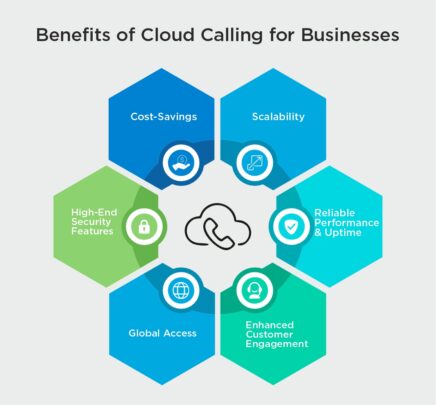Are traditional phone lines holding your business back?
Of course, limited features, high maintenance, and outdated infrastructure might be costing you a lot! Welcome to the world of cloud telephony, which enables you to make outbound calls and receive inbound calls with a simple, internet-connected device.
The standout voice communication model, cloud telephony, comes with a range of benefits, including flexibility, scalability, cost savings, and transforming the way businesses communicate. According to sources, the cloud telephony market is anticipated to grow at the fastest pace in the coming years. By 2029 it will grow $71.3 billion at a CAGR of 17.4%.
Here is a blog that covers everything about cloud telephony, including its definition, key features, and business benefits.
Let’s get started!
What is Cloud Telephony?
Cloud telephony is basically a type of unified communication as a service (UCaaS) that works on a cloud computing model. It is often called cold calling which uses Voice over IP (VoIP) to link your voice to the internet to make phone calls. This is managed by a third-party provider through a cloud server.
It’s ideal for businesses with employees that work remotely or off-site frequently. Alongside, one major benefit is that businesses and their agents can operate from different locations, all thanks to the power of cloud environments that support remote work culture.
How Does Cloud Telephony Work?
Check out how cloud telephony works:
Cloud telephony is a game-changing technology that transforms analog voice signals into digital packets, further sending them across the internet. When a call is made, a third-party VoIP (Voice over Internet Provider) routes the number into the cloud hosted by the provider.
Like, in traditional phone systems where there is a need for expensive PBX (Private Branch Exchange) systems that need in-house management. The Cloud telephony providers offer everything, so you can focus on your business goals. This includes assisting with setting up, operating with operating and ongoing support, and more.
Some key components of cloud telephony:
-
- VoIP technolo
- A secure internet connection
- A strong cloud infrastructure
- A third-party cloud service provider
Features of Cloud Calling for Businesses
Compatible with Different Devices
This feature allows people to make and receive calls from anywhere.
Call forwarding and routing
Make sure calls are routed to the right person or team by following the correct rules and preferences.
Call recording feature
Other standout features are quality control, training, recording voicemail transactions, and more.
Analytics and Reporting
Offers metrics such as detailed call information, call volume, and duration that allow organizations to make business decisions.
Top-Notch Security
All the security measures are in place to protect the call's privacy and prevent scammers.
Sharing the Top Benefits of Cloud Calling for Businesses
Cloud telephony, often called cloud calling, is a great benefit for your business when it comes to making or receiving calls. Here we have listed a few:
1. Cost-Savings
One of the major benefits is cloud calling; you don’t need to invest in purchasing or managing hardware like phones and servers. The cloud telephony provider takes care of everything for you! Also, there’s the option of pay-as-you-go for pay-what-you-use, so you can save big likewise.
2. Scalability
Cloud-based phone systems let you scale easily. No matter if you're in the growth phase or scaling down. Users can be added, new locations can be established, and telephone lines can be added from the web in a matter of minutes without paying or spending time on installation.
3. Reliable Performance & Uptime
Trusted cloud-calling providers offer a strong uptime guarantee and built-in disaster recovery. This way, you can rest assured that your communications are always up even during an outage or unexpected event.
4. Enhanced Customer Engagement
Giving the best support possible to the customers! With clear calls and no interruptions, you can offer a better customer experience. Further, tech innovations such as leveraging a CRM platform, to capture all details on customer interactions, call routing, voicemail-to-email, AI-generated transcription, etc., will help you never miss a detail to provide a more effective and timely response to your customer.
5. Global Access
With cloud calling, teams, customers, and partners can connect globally by using local numbers. This allows companies to have global access, with no distance or border.
6. High-End Security Features
Modern cloud phone systems offer all the top-notch security features that guarantee encryption, data center protection, and secure data storage to keep communications private and secure.
Use Cases of Cloud Telephony
Business Communication
Cloud telephony is ideal for business communication, allowing businesses of all sizes and in all sectors to effectively handle incoming and outgoing calls.
Remote Work
Using desktop computers, laptops, or cell phones, cloud telephony allows workers to work in one place and be productive from any location.
Customer Support
Call queuing, routing, and CRM integration are just a few of the capabilities that cloud telephony offers for better customer support.
Sales and Marketing
This is perfect for the marketing and sales teams that monitor and evaluate call data, allowing businesses to measure return on investment, spot patterns, and improve campaigns.
Wrapping it Up!
Cloud calling stands as one of the top-notch communication tools that offer companies everything they need to scale their business. All thanks to the VoIP technology that makes it possible. Moreover, it’s also essential to choose the right cloud telephony provider; after all, the choice is yours!
Want to stay informed about all the tech-trending blogs? We’ve got you covered here.
FAQs
Q: What is the key difference between cloud telephony and VoIP?
Ans: The basic difference is, cloud telephony works through internet-hosted solutions and manages the phone calls, while VoIP (Voice Over Internet Protocol) is the connection through which the calls are transmitted.
Q: What are the disadvantages of cloud telephony?
Ans: Cloud telephony, as it comes with great benefits, has some disadvantages too. One of the reasons is that cloud calling needs continuous internet connectivity to make quality calls.
Q: What are telephony devices?
Ans: That’s simple! Telephony systems are basically a collection of tools and technology that make voice communication a breeze and help multimedia data transfer over the internet.
Recommended For You:
Everything you need to Know about Voice over Internet Protocol (VoIP)
Advantages and Disadvantages of VoIP Explained





